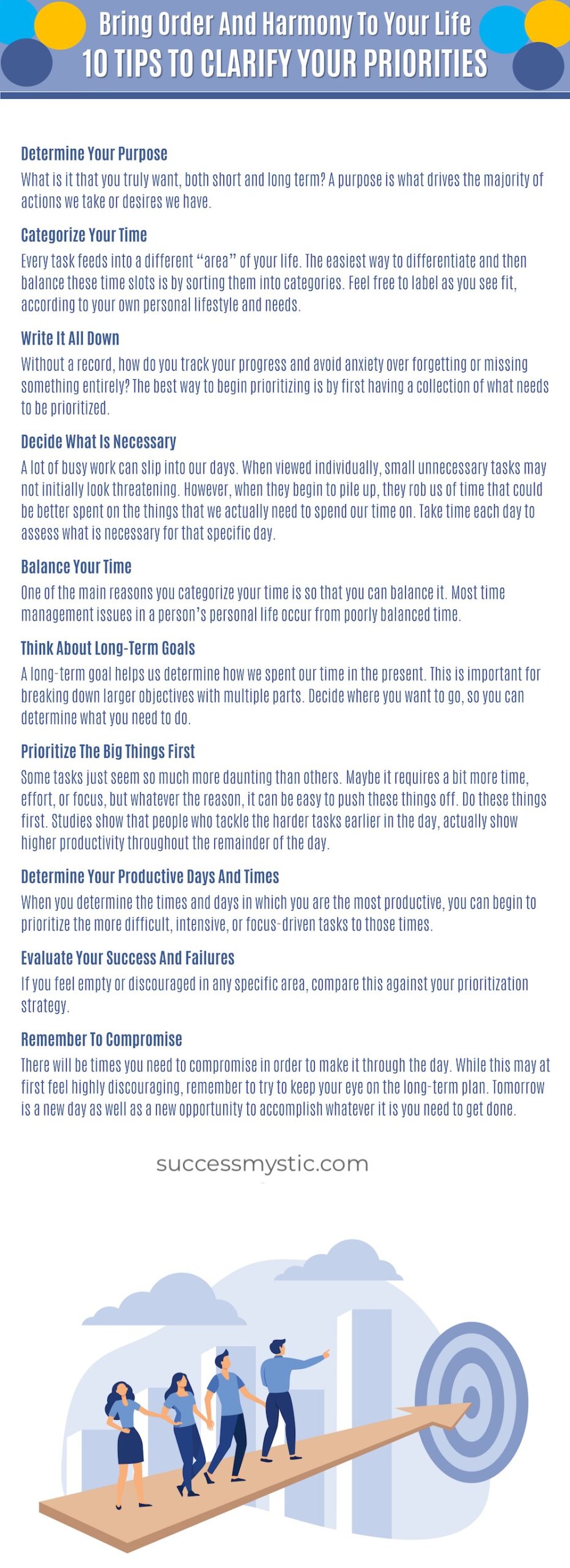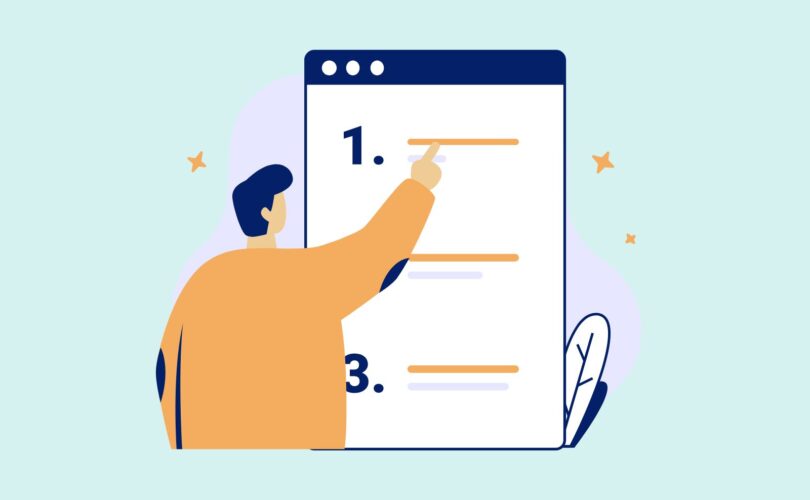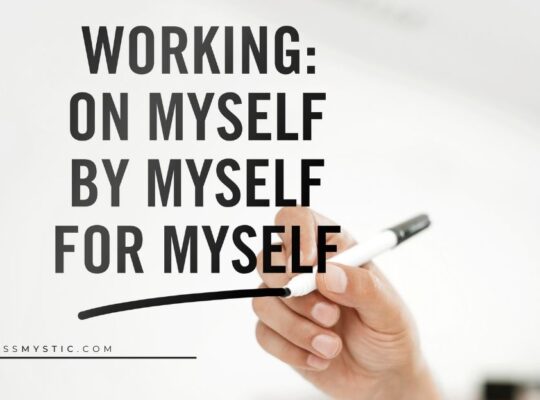It’s Time To Bring Order And Harmony To Your Life: 10 Tips To Clarify Your Priorities
Like a budget, every day you are given a finite amount of time to spend. Despite the time being limited, it might feel like your tasks are limitless, from obligations at work, responsibilities at home, your sleep, physical exercise, eating, hobbies, and even relaxation.
You can’t possibly wake up every morning expecting to accomplish everything, so it’s important to have a strategy, and this is where prioritization comes into play.
Here are 10 tips you can use to clarify your priorities.
#1 Determine your purpose.
What is it that you truly want, both short and long term? A purpose is what drives the majority of actions we take or desires we have. You may share a purpose with some of those around you, or you might experience a completely different set of objectives. It’s important to understand what it is that you hope to do with your life, as it will and should influence virtually every decision you make.
For instance, a family man, less concerned with his status at work and more interested in having time at home can have vastly different priorities than a single man focused on his long-term career aspirations. Things like wealth and status are often praised, but these things are not the driving force of every individual. Figure out what it is you want, and you’ll have a better understanding of how to get there.
#2 Categorize your time.
Every task feeds into a different “area” of your life. The easiest way to differentiate and then balance these time slots is by sorting them into categories. For some, these categories could be work, family, pleasure, and growth. You may also break them down by the 5 major goals: career, financial, relationships, personal, and spiritual. Feel free to label as you see fit, according to your own personal lifestyle and needs.
#3 Write it all down.
When first starting, one easy way to prioritize is by writing everything down. Mentally juggling tasks can be exhausting. You may get overwhelmed, feeling like things will never let up. Without a record, how do you track your progress and avoid anxiety over forgetting or missing something entirely? The best way to begin prioritizing is by first having a collection of what needs to be prioritized.
#4 Decide what is necessary.
A lot of busy work can slip into our days. When viewed individually, small unnecessary tasks may not initially look threatening. However, when they begin to pile up, they rob us of time that could be better spent on the things that we actually need to spend our time on.
Take time each day to assess what is necessary for that specific day. Is anyone expecting me to finish this today? Will I need to accomplish this task before moving on to another? Can this be moved to another day without negative repercussions? If something is found to be inessential, then be sure that it falls lower on your priority list.
#5 Balance your time.
One of the main reasons you categorize your time is so that you can balance it. Most time management issues in a person’s personal life occur from poorly balanced time. If you color code the ways you spend your time, are you seeing an even disbursement of colors, or is one dominating your day? For example, if family life is your highest priority, make sure that your time reflects this.
#6 Think about long-term goals.
Your efforts should always be working toward some ultimate goal or objective. It can be something simple, like planning for a vacation next year, or even something more complex, like earning a promotion to executive within the next 5 years. A long-term goal helps us determine how we spent our time in the present. This is important for breaking down larger objectives with multiple parts. Decide where you want to go, so you can determine what you need to do.
#7 Prioritize the big things first.
Some tasks just seem so much more daunting than others. Maybe it requires a bit more time, effort, or focus, but whatever the reason, it can be easy to push these things off. Do these things first. Studies show that people who tackle the harder tasks earlier in the day, actually show higher productivity throughout the remainder of the day. The reason being is that this method helps promote your overall sense of motivation as well as limiting the productivity-killing habit of procrastination.
#8 Determine your productive days and times.
Everyone has a mix of productive and unproductive days. Some people report feeling most productive first thing after they wake up in the morning, while others feel the best later into the afternoon. External factors, such as routine physical activity or obligations can also impact how productive certain days are over others. When you determine the times and days in which you are the most productive, you can begin to prioritize the more difficult, intensive, or focus-driven tasks to those times.
#9 Evaluate your success and failures.
Since prioritization is so personal to your own experience, it’s important that you reflect on strategies as you use them. Write down and keep a record of things that worked for you, as well as the approaches that didn’t. On a deeper level, evaluate how you are emotionally, psychologically, physically, and spiritually handling your current schedule. If you feel empty or discouraged in any specific area, compare this against your prioritization strategy.
#10 Remember to compromise.
There are many uncontrollable elements in our days. An unexpected car issue could derail your plans as likely as unforeseen bad weather. Maybe a family emergency comes up or maybe someone you prioritize highly just needs a helping hand.
There will be times you need to compromise in order to make it through the day. While this may at first feel highly discouraging, remember to try to keep your eye on the long-term plan. Tomorrow is a new day as well as a new opportunity to accomplish whatever it is you need to get done.
Final Thoughts
Don’t underestimate the power of priorities. Whether you detail them or not, they will always influence the decisions we make on a daily basis. When you get lost in the chaos and lose sight of these priorities, you’re more likely to feel discouraged by your surroundings.
These tips are a great way to clear up the confusion, focus on what truly matters, accomplish what’s important to your purpose, and bring some satisfying order to your life.








